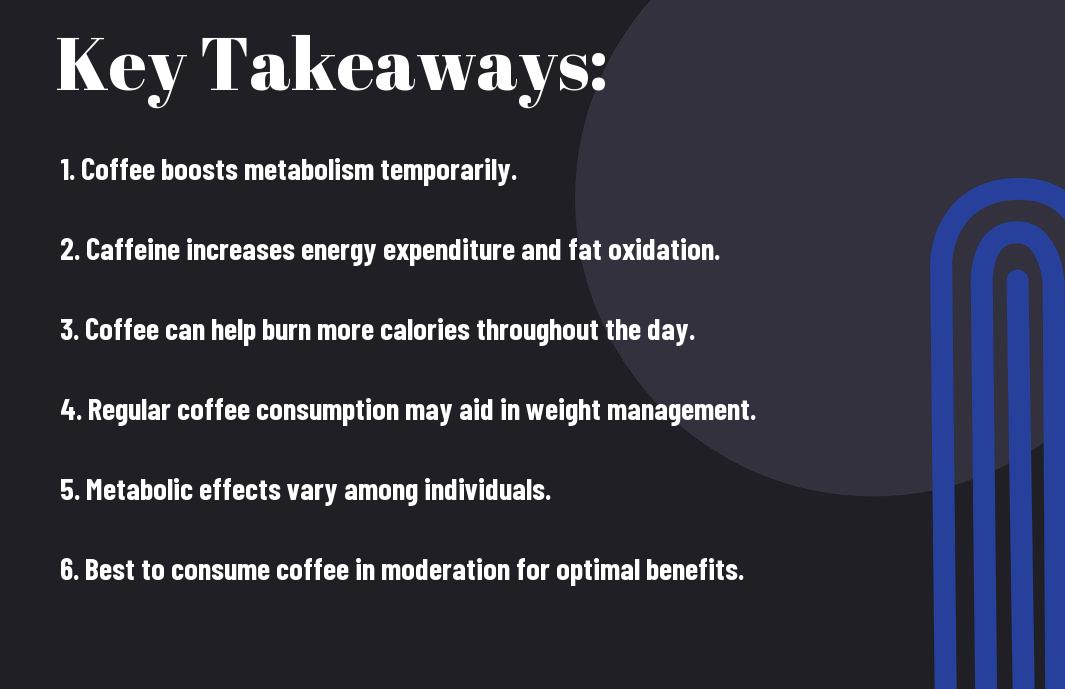Over your morning cup of coffee, have you ever wondered about its impact on your metabolism? Let’s research into the science behind this popular beverage and uncover how it affects your body’s ability to burn calories and regulate energy levels. By understanding the relationship between coffee and metabolism, you can make informed choices about your daily caffeine intake and its potential effects on your overall health and well-being.
Key Takeaways:
- Caffeine boosts metabolism: Coffee contains caffeine, a natural stimulant that can increase your metabolic rate, leading to more calories burned.
- Enhanced fat burning: Caffeine can also stimulate the breakdown of fats, releasing them into the bloodstream as free fatty acids for energy.
- Temporary effects: The metabolic effects of coffee are temporary and may vary among individuals based on factors like age, weight, and tolerance to caffeine.
- Calorie burning potential: Drinking coffee before exercise can potentially enhance your calorie burning during physical activity due to increased metabolism.
- Consider moderation: While coffee can have metabolic benefits, excessive consumption may lead to negative side effects like insomnia, restlessness, and jitteriness.

The Metabolic Boost
While many people reach for a cup of coffee to kickstart their day, the benefits of that morning brew extend beyond just providing a caffeine boost. Coffee can actually have a positive impact on your metabolism, helping you burn calories more efficiently throughout the day.
Caffeine’s Stimulating Effect
With its central ingredient being caffeine, coffee works as a stimulant to the central nervous system. When consumed, caffeine can increase the release of neurotransmitters like dopamine and norepinephrine. This heightened neural activity can lead to improved mood, increased alertness, and enhanced cognitive function. Additionally, caffeine has been shown to enhance physical performance by mobilizing fatty acids from the fat tissues, making them available for use as energy.
Increased Energy Expenditure
Effectively, the stimulation caused by caffeine can also lead to an increase in energy expenditure. Studies suggest that caffeine can boost metabolic rate by 3-11%, with the effects lasting for a few hours after consumption. This means that your body is burning more calories, even when at rest, which can contribute to weight loss and weight management over time.
Increased energy expenditure can also be attributed to the thermogenic effect of caffeine. The body produces heat as a result of digesting and metabolizing food, a process known as thermogenesis. Caffeine enhances this thermogenic effect, leading to a temporary increase in energy expenditure and calorie burning.
Coffee’s Impact on Insulin Sensitivity
The Role of Insulin in Metabolism
Some may wonder how insulin plays a crucial role in our metabolism. Insulin, a hormone produced by the pancreas, is responsible for regulating blood sugar levels. When we consume food, especially carbohydrates, our blood sugar spikes, prompting the pancreas to release insulin. Insulin helps cells in the body absorb glucose from the bloodstream for energy production or storage. This process is vital for maintaining stable blood sugar levels and ensuring our cells receive the fuel they need to function properly.
How Caffeine Affects Insulin Sensitivity
Sensitivity to insulin is imperative for overall metabolic health. Any alterations in insulin sensitivity can impact how efficiently our body utilizes glucose. Studies have suggested that caffeine, a prominent component in coffee, may influence insulin sensitivity. Research has shown that caffeine can enhance insulin sensitivity in some individuals, potentially leading to better blood sugar control. However, the effects of caffeine on insulin sensitivity can vary among different people based on factors like genetics, diet, and overall health status.
Impact of caffeine on insulin sensitivity is intriguing as it may offer potential benefits for individuals struggling with blood sugar regulation. However, it’s imperative to consider individual variations and consult with healthcare professionals when making significant changes to your diet or lifestyle.
The Connection to Weight Loss
All coffee drinkers have likely heard the buzz about how caffeine can impact metabolism. According to Can Caffeine Boost Metabolism and Help You Burn Fat?, caffeine is known to stimulate thermogenesis, which is the process where your body generates heat and energy from digesting food. This can lead to an increase in metabolic rate, potentially aiding in weight loss efforts.
Caffeine’s Appetite-Suppressing Properties
The consumption of caffeine has also been associated with appetite suppression. When you drink a cup of coffee, the caffeine can help reduce feelings of hunger, leading to lower calorie intake throughout the day. This can be particularly beneficial for those looking to manage their weight or reduce their overall caloric consumption.
Enhanced Fat Burning
The link between caffeine and enhanced fat burning is a topic that has intrigued researchers for years. Studies have shown that caffeine can enhance the oxidation of fat, which means your body may be better equipped to use fat as a fuel source during physical activity. This can potentially have a positive impact on weight management and fat loss goals.
This connection between caffeine consumption and enhanced fat burning is one reason why many athletes and fitness enthusiasts turn to coffee or caffeine supplements as part of their pre-workout routine. By aiding in the mobilization and utilization of fat stores, caffeine can potentially improve endurance and overall performance during exercise.

The Dark Side: Negative Effects on Metabolism
Jitters and Anxiety
Keep in mind that while a cup of coffee can give you that much-needed energy boost, consuming too much can lead to negative side effects on your metabolism. One common issue is experiencing jitters and anxiety, especially if you are sensitive to caffeine. These symptoms occur because caffeine stimulates your central nervous system, causing a temporary increase in alertness but also triggering a stress response in the body.
Disrupted Sleep Patterns
Negative impacts on your metabolism can also manifest in disrupted sleep patterns due to excessive coffee consumption. Anxiety and restlessness caused by caffeine intake can interfere with your ability to fall asleep and experience restful sleep cycles. This disruption in your sleep patterns can have a detrimental effect on your metabolism, as sleep is crucial for regulating hormones that control appetite and energy expenditure.
For instance, when you don’t get enough quality sleep, your body produces more ghrelin, the hunger hormone, leading to increased cravings and potential weight gain. Additionally, insufficient sleep can disrupt the balance of insulin, cortisol, and leptin – hormones that play a key role in metabolism regulation. Therefore, it’s necessary to be mindful of your coffee intake and its impact on your sleep quality to maintain a healthy metabolism.
Individual Variations in Metabolic Response
Not everyone metabolizes coffee in the same way. There are several factors that can influence how caffeine is processed in the body, leading to individual variations in metabolic response.
Genetic Factors Influencing Caffeine Metabolism
- Genetic variations in the CYP1A2 enzyme can impact how efficiently the body metabolizes caffeine.
- Polymorphisms in the ADORA2A gene may influence an individual’s sensitivity to caffeine.
- Other genetic factors can also play a role in how quickly caffeine is broken down in the body.
Any of these genetic variations can lead to differences in how individuals respond to caffeine consumption, affecting factors like metabolism and energy levels.
Age, Sex, and Body Composition Differences
Metabolic rates can vary based on age, sex, and body composition. Younger individuals tend to have higher metabolic rates than older adults, meaning they may process caffeine more quickly. Additionally, men generally have a faster metabolism than women, which can impact how caffeine affects their bodies differently. Body composition, including muscle mass and fat percentage, also plays a role in metabolic differences.
Understanding these individual variations in metabolic response can help explain why some people can drink coffee late in the day and still sleep soundly, while others may be wide awake after just one cup. By considering genetic factors, age, sex, and body composition differences, we can better understand how coffee impacts metabolism on an individual level.

Balancing Coffee Consumption for Optimal Metabolism
Moderate Coffee Drinking: The Sweet Spot
Unlike excessive coffee consumption, moderate coffee drinking can have potential benefits for your metabolism. Drinking a moderate amount of coffee, typically defined as 3-4 cups per day, can help increase your metabolic rate and improve fat oxidation. The caffeine in coffee stimulates the central nervous system, leading to a temporary boost in metabolism and increased calorie burning.
However, it’s necessary to be mindful of what you add to your coffee as excess sugar, cream, or syrups can negate the positive effects on metabolism. Opt for black coffee or use natural sweeteners to avoid unnecessary empty calories that can hinder your metabolic health.
Avoiding Excessive Caffeine Intake
Spotting excessive caffeine intake is crucial for maintaining a healthy metabolism. While caffeine can temporarily boost metabolism, overconsumption can lead to negative side effects such as jitteriness, insomnia, and increased heart rate. It’s important to listen to your body’s signals and limit your coffee intake if you start feeling anxious or experiencing adverse effects.
Metabolism can also be negatively impacted by too much caffeine, as it can disrupt sleep patterns, leading to fatigue and a slowdown in metabolic functions. Ensure you balance your coffee consumption with adequate hydration and a well-rounded diet rich in nutrients to support a healthy metabolism.
To wrap up
Drawing together the information presented, it is evident that coffee can have a significant impact on metabolism. The caffeine in coffee can increase metabolic rate, promote fat burning, and improve overall energy levels. However, it is important to note that individual responses to caffeine can vary, and moderation is key when it comes to coffee consumption.
By understanding how coffee affects metabolism, individuals can make informed choices about their caffeine intake to best support their health and wellness goals. Whether enjoying a morning cup of coffee for an energy boost or utilizing caffeine strategically for exercise performance, the relationship between coffee and metabolism is an intriguing area of study worth exploring further.
FAQ
Q: Does coffee really boost metabolism?
A: Yes, coffee can temporarily boost metabolism due to its caffeine content, which stimulates the central nervous system and increases energy expenditure.
Q: How does caffeine in coffee affect metabolic rate?
A: Caffeine in coffee can increase metabolic rate by around 3-11%, leading to greater calorie burning and potential weight loss over time.
Q: Are there any long-term effects of drinking coffee on metabolism?
A: Some studies suggest that habitual coffee consumption may help maintain a higher metabolic rate, but individual responses can vary based on factors like genetics and lifestyle.
Q: Can drinking too much coffee have a negative impact on metabolism?
A: Excessive coffee consumption, especially with added sugars and creamers, can contribute to weight gain and metabolic issues over time, so moderation is key.
Q: Is black coffee more beneficial for metabolism than coffee with additives?
A: Black coffee is the healthiest option for metabolism, as added sugars and creams can introduce extra calories and potentially negate some of the metabolic benefits of coffee.
What are the origins of coffee








